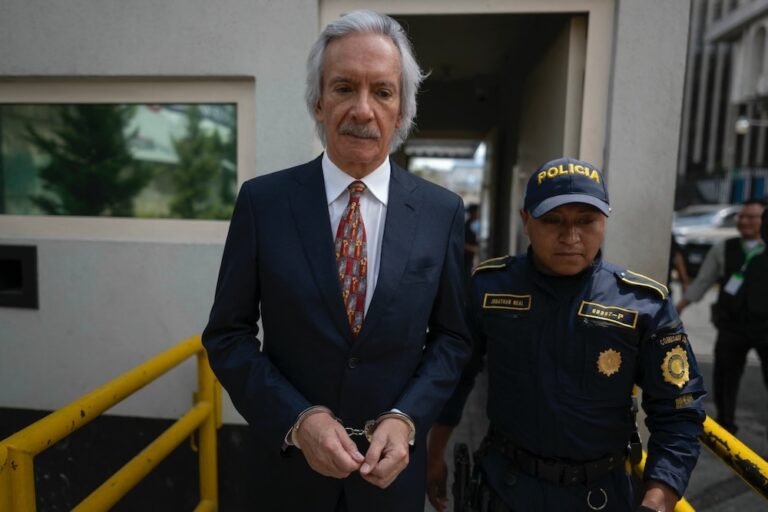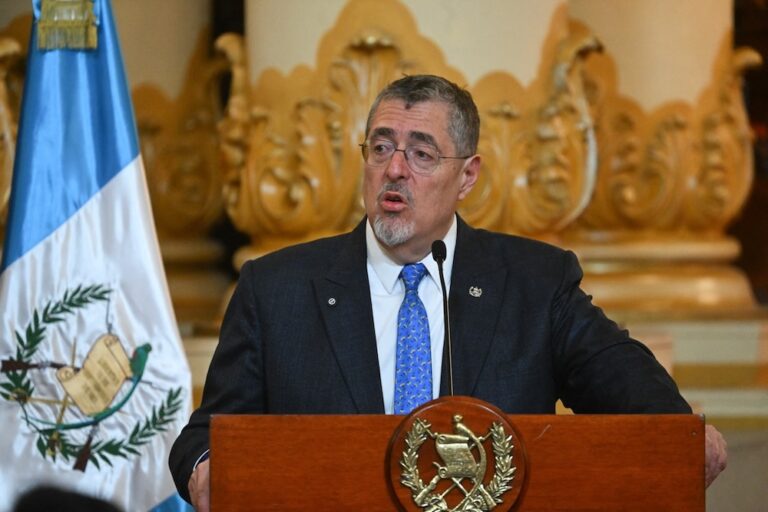(AMARC/IFEX) – The following is a 28 January 2002 AMARC press release: AMARC expresses concern over opening up of public auction (28 January 2002) – On 24 January, the Guatemalan Superintendency of Telecommunications (Superintendencia de Telecomunicaciones de Guatemala, SIT) announced its intent to reopen a public auction for the allocation of radio broadcasting frequencies. This […]
(AMARC/IFEX) – The following is a 28 January 2002 AMARC press release:
AMARC expresses concern over opening up of public auction
(28 January 2002) – On 24 January, the Guatemalan Superintendency of Telecommunications (Superintendencia de Telecomunicaciones de Guatemala, SIT) announced its intent to reopen a public auction for the allocation of radio broadcasting frequencies. This announcement disregards recommendations made by the Organisation of American States’ (OAS) special rapporteur on freedom of expression and the opinions of a number of Guatemalan civil society groups.
The World Association of Community Radio Broadcasters’ (AMARC) Legal Programme in Latin America and the Caribbean expressed concern over the possibility of these announcements becoming a reality due to their antidemocratic nature. Moreover, it would hinder the success of democratic initiatives soon to be passed by Congress, such as the one driven by the Guatemalan Community Communications Council (Consejo Guatemalteco de Comunicación Comunitaria, CGCC), Congress’ Indigenous Peoples Commission (Comisión Comunidades IndÃgenas del Congreso) and the government’s Social Communications Secretariat (SecretarÃa de Comunicación Social).
Recently these three bodies issued a joint press release noting that the Community Media Law had received extensive support. The law is in line with the peace accords and international treaties, as well as recommendations made by the Inter-American Commission on Human Rights (IACHR) in its April 2001 Special Human Rights Report on Guatemala. The report recommends that the Guatemalan government “review the regulations governing the granting of radio and television licenses with the purpose of incorporating democratic criteria guaranteeing equal opportunity.”
In relation to this, the IACHR report states that, “the procedures for the granting and renewal of broadcast licenses should be clear, fair and objective, and the importance of the media in fostering informed participation in democratic processes should be given due consideration.”
“The Office of the Special Rapporteur wishes to point out that democratic criteria ensuring the participation of all sectors of Guatemalan society should be taken into consideration when granting licenses for television channels and radio frequencies. Bidding procedures that do not go beyond economic considerations, or that do not give a fair chance to all social sectors, are incompatible with participatory democracy and the right of freedom of expression and information enshrined in the American Convention on Human Rights.”
In the joint press release it was highlighted that, “the Guatemalan Radio Broadcasting Guild (Cámara Guatemalteca de Radiodifusión) felt that the community radio station movement complements public and private radio broadcasting (â¦). The Strategic Analysis Secretariat (SecretarÃa de Análisis Estratégico) values the technical aspects of the law promoted by CGCC. During interviews held this week, the European Commission’s Office also welcomed the proposal.”
The Guatemalan Community Communications Council’s (Consejo Guatemalteco de Comunicación Comunitaria, CGCC) proposal both modernises and democratises the Telecommunications Law, providing indigenous peoples and other sectors of society with access to their own media outlets. It is also noteworthy that a broader consensus was reached in the search for solutions. It is crucial that the proposal receive the utmost support for its approval. At the same time, all attempts to block, minimise or destroy these democratic inroads must be stopped. This struggle forms part of the ongoing international and national effort to improve the state of freedom of expression and the press in the country.
Subsequently, AMARC calls on:
– the Guatemalan government to reject SIT’s call to publicly auction radio frequencies,
– Congress to accelerate the passing of the Community Media Law,
– MINUGUA (United Nations Mission in Guatemala) and the IACHR to use whatever means at their disposal to ensure that there are no new freedom of expression violations and to encourage consideration of the law that enables Guatemalans, especially the indigenous peoples, to exercise their right to communication,
– the international community to join forces in defending freedom of expression in Guatemala and ensuring that the human rights peace accords and international treaties are upheld.


